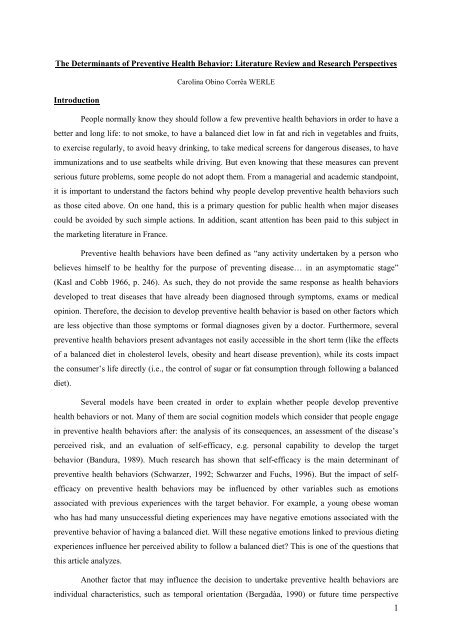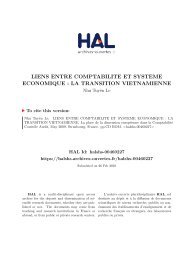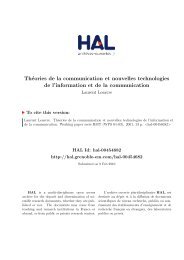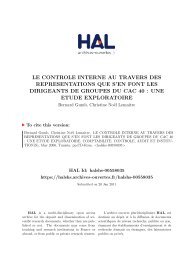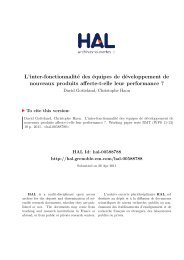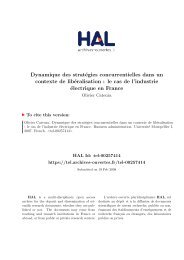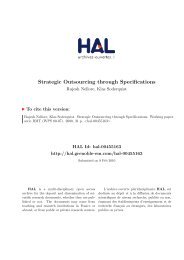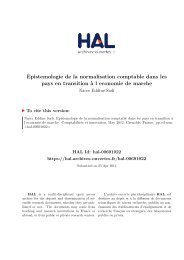The Determinants of Preventive Health Behavior: Literature Review ...
The Determinants of Preventive Health Behavior: Literature Review ...
The Determinants of Preventive Health Behavior: Literature Review ...
Create successful ePaper yourself
Turn your PDF publications into a flip-book with our unique Google optimized e-Paper software.
<strong>The</strong> <strong>Determinants</strong> <strong>of</strong> <strong>Preventive</strong> <strong>Health</strong> <strong>Behavior</strong>: <strong>Literature</strong> <strong>Review</strong> and Research Perspectives<br />
Carolina Obino Corrêa WERLE<br />
Introduction<br />
People normally know they should follow a few preventive health behaviors in order to have a<br />
better and long life: to not smoke, to have a balanced diet low in fat and rich in vegetables and fruits,<br />
to exercise regularly, to avoid heavy drinking, to take medical screens for dangerous diseases, to have<br />
immunizations and to use seatbelts while driving. But even knowing that these measures can prevent<br />
serious future problems, some people do not adopt them. From a managerial and academic standpoint,<br />
it is important to understand the factors behind why people develop preventive health behaviors such<br />
as those cited above. On one hand, this is a primary question for public health when major diseases<br />
could be avoided by such simple actions. In addition, scant attention has been paid to this subject in<br />
the marketing literature in France.<br />
<strong>Preventive</strong> health behaviors have been defined as “any activity undertaken by a person who<br />
believes himself to be healthy for the purpose <strong>of</strong> preventing disease… in an asymptomatic stage”<br />
(Kasl and Cobb 1966, p. 246). As such, they do not provide the same response as health behaviors<br />
developed to treat diseases that have already been diagnosed through symptoms, exams or medical<br />
opinion. <strong>The</strong>refore, the decision to develop preventive health behavior is based on other factors which<br />
are less objective than those symptoms or formal diagnoses given by a doctor. Furthermore, several<br />
preventive health behaviors present advantages not easily accessible in the short term (like the effects<br />
<strong>of</strong> a balanced diet in cholesterol levels, obesity and heart disease prevention), while its costs impact<br />
the consumer’s life directly (i.e., the control <strong>of</strong> sugar or fat consumption through following a balanced<br />
diet).<br />
Several models have been created in order to explain whether people develop preventive<br />
health behaviors or not. Many <strong>of</strong> them are social cognition models which consider that people engage<br />
in preventive health behaviors after: the analysis <strong>of</strong> its consequences, an assessment <strong>of</strong> the disease’s<br />
perceived risk, and an evaluation <strong>of</strong> self-efficacy, e.g. personal capability to develop the target<br />
behavior (Bandura, 1989). Much research has shown that self-efficacy is the main determinant <strong>of</strong><br />
preventive health behaviors (Schwarzer, 1992; Schwarzer and Fuchs, 1996). But the impact <strong>of</strong> selfefficacy<br />
on preventive health behaviors may be influenced by other variables such as emotions<br />
associated with previous experiences with the target behavior. For example, a young obese woman<br />
who has had many unsuccessful dieting experiences may have negative emotions associated with the<br />
preventive behavior <strong>of</strong> having a balanced diet. Will these negative emotions linked to previous dieting<br />
experiences influence her perceived ability to follow a balanced diet? This is one <strong>of</strong> the questions that<br />
this article analyzes.<br />
Another factor that may influence the decision to undertake preventive health behaviors are<br />
individual characteristics, such as temporal orientation (Bergadàa, 1990) or future time perspective<br />
1


